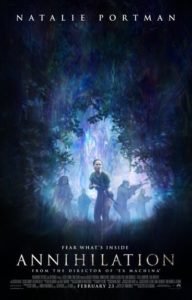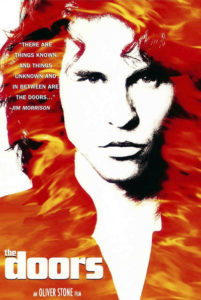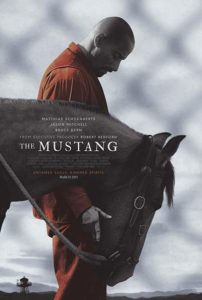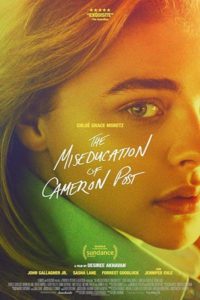
It took me two watches, some 12 months apart from one another, for me to be able to say emphatically that Alex Garland’s (
Ex Machina)
Annihilation isn’t a great movie. While I appreciate its ingenuity and ambition, the overall execution, delivery, and continuity could not be overlooked. For as much as I was in awe of Garland’s 2015 directorial debut,
Ex Machina, I was even more disappointed with
Annihilation, a movie for me that came and went as it felt, broke its own rules, left me bored at times, and hoping for more, while knowing it was never going quite to deliver.
With a critics’ score of 88% but an audience score of just 66%, I am comfortable saying that, after watching it twice, some artistry I was missing made this movie so likable by those who review movies for a living. I couldn’t help but remove myself from critic mode and, even after taking off that hat, couldn’t get behind
Annihilation to come close to recommending it.
Continue reading Annihilation (2018) →
 Consistent with many of the most successful biopics about the greatest of American songwriters/bands (i.e., Walk the Line, Ray, Love & Mercy, La Bamba, What’s Love Got to Do With It, 8 Mile, Great Balls of Fire, Straight Outta Compton, Bohemian Rhapsody) in the last 30 years comes Oliver Stone’s (Platoon, Born on the Fourth of July) distant, unsteady, and unapologetic story of Jim Morrison and his band in the 1991 movie The Doors. Liked more by audiences than critics, the Val Kilmer (Top Gun, Heat) led movie takes us through the formation of the band in the early 1960s to Morrison’s mysterious 1971 death in a Paris bathtub at the age of 27. One of the founding members of the infamous 27 Club, Morrison was an energizing performer whose limit-pushing love of drugs and alcohol led to his early death.
Consistent with many of the most successful biopics about the greatest of American songwriters/bands (i.e., Walk the Line, Ray, Love & Mercy, La Bamba, What’s Love Got to Do With It, 8 Mile, Great Balls of Fire, Straight Outta Compton, Bohemian Rhapsody) in the last 30 years comes Oliver Stone’s (Platoon, Born on the Fourth of July) distant, unsteady, and unapologetic story of Jim Morrison and his band in the 1991 movie The Doors. Liked more by audiences than critics, the Val Kilmer (Top Gun, Heat) led movie takes us through the formation of the band in the early 1960s to Morrison’s mysterious 1971 death in a Paris bathtub at the age of 27. One of the founding members of the infamous 27 Club, Morrison was an energizing performer whose limit-pushing love of drugs and alcohol led to his early death.
 Consistent with many of the most successful biopics about the greatest of American songwriters/bands (i.e., Walk the Line, Ray, Love & Mercy, La Bamba, What’s Love Got to Do With It, 8 Mile, Great Balls of Fire, Straight Outta Compton, Bohemian Rhapsody) in the last 30 years comes Oliver Stone’s (Platoon, Born on the Fourth of July) distant, unsteady, and unapologetic story of Jim Morrison and his band in the 1991 movie The Doors. Liked more by audiences than critics, the Val Kilmer (Top Gun, Heat) led movie takes us through the formation of the band in the early 1960s to Morrison’s mysterious 1971 death in a Paris bathtub at the age of 27. One of the founding members of the infamous 27 Club, Morrison was an energizing performer whose limit-pushing love of drugs and alcohol led to his early death.
Consistent with many of the most successful biopics about the greatest of American songwriters/bands (i.e., Walk the Line, Ray, Love & Mercy, La Bamba, What’s Love Got to Do With It, 8 Mile, Great Balls of Fire, Straight Outta Compton, Bohemian Rhapsody) in the last 30 years comes Oliver Stone’s (Platoon, Born on the Fourth of July) distant, unsteady, and unapologetic story of Jim Morrison and his band in the 1991 movie The Doors. Liked more by audiences than critics, the Val Kilmer (Top Gun, Heat) led movie takes us through the formation of the band in the early 1960s to Morrison’s mysterious 1971 death in a Paris bathtub at the age of 27. One of the founding members of the infamous 27 Club, Morrison was an energizing performer whose limit-pushing love of drugs and alcohol led to his early death.
 Roman Coleman, the career-defining role that journeyman Matthias Schoenaerts (Rust and Bone,
Roman Coleman, the career-defining role that journeyman Matthias Schoenaerts (Rust and Bone,  It took me two watches, some 12 months apart from one another, for me to be able to say emphatically that Alex Garland’s (
It took me two watches, some 12 months apart from one another, for me to be able to say emphatically that Alex Garland’s ( A much anticipated same-sex attraction/sexual attraction conversion therapy movie had been initially projected to earn multiple Oscar nominations. Unfortunately, the Lucas Hedges/Nicole Kidman/Joel Edgerton/Russell Crowe
A much anticipated same-sex attraction/sexual attraction conversion therapy movie had been initially projected to earn multiple Oscar nominations. Unfortunately, the Lucas Hedges/Nicole Kidman/Joel Edgerton/Russell Crowe  Coralie Fargeat’s Revenge (a terrible title since it has the same name as the Kevin Costner 1990 movie, a 2002 Roman Polanski film, a 1971 Shelley Winters film, and more) might be the best movie of 2018 you have yet to hear about. However, I can’t think of a better one for a movie that makes no bones about it, a movie about revenge, and nothing more. Driven by a first-time director in Fargeat, a cast that has no one that you’ve ever heard of, and a marketing campaign that likely consisted only of trailers on just as unknown straight-to-DVD releases, Revenge earned less than $125,000 at the box office and its limited May 2018 release, the movie
Coralie Fargeat’s Revenge (a terrible title since it has the same name as the Kevin Costner 1990 movie, a 2002 Roman Polanski film, a 1971 Shelley Winters film, and more) might be the best movie of 2018 you have yet to hear about. However, I can’t think of a better one for a movie that makes no bones about it, a movie about revenge, and nothing more. Driven by a first-time director in Fargeat, a cast that has no one that you’ve ever heard of, and a marketing campaign that likely consisted only of trailers on just as unknown straight-to-DVD releases, Revenge earned less than $125,000 at the box office and its limited May 2018 release, the movie